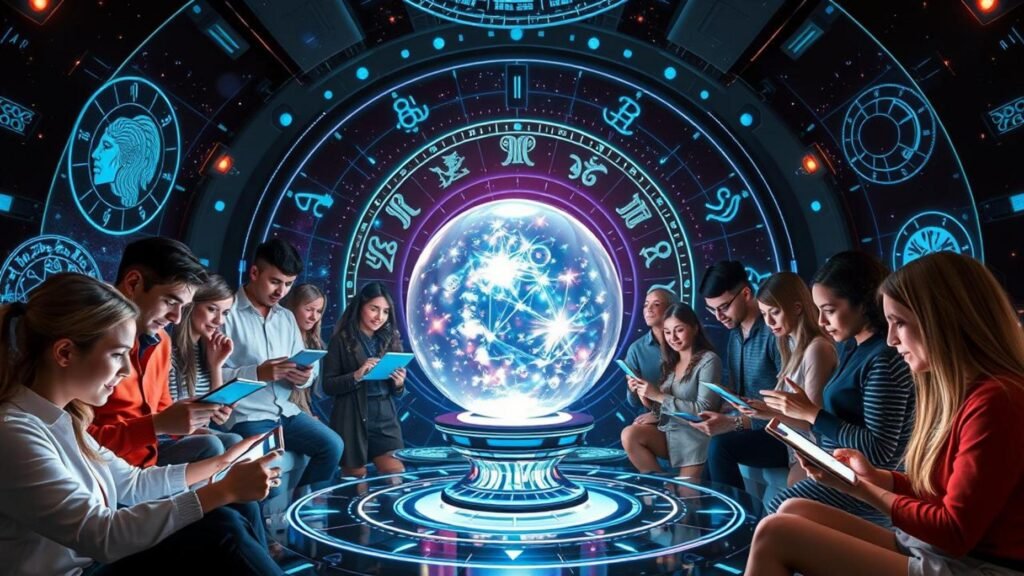Tech Spirituality: Merging Science with Mysticism in AI Astrology
The realm of AI astrology represents a fascinating convergence of technology and spirituality, a hallmark of what some enthusiasts refer to as “tech spirituality.” This intersection not only redefines the landscape of traditional astrology but also invites a deeper understanding of human psychology and our quest for meaning in an increasingly complex world.
The Integration of AI in Astrology
AI tools for astrology, such as AI tarot and digital fortune telling, leverage big data and predictive algorithms to generate personalized insights based on astrological principles. By synthesizing vast amounts of information, these tools can offer users detailed predictions tailored to their specific birth charts or astrological placements. The potential for personalization is one of the core reasons many users are drawn to these digital psychic services.
Research continues to explore how AI can simulate aspects of human intuition often associated with traditional astrological practices. For example, AI can recognize patterns and trends across thousands of user profiles, drawing on historical data to make predictions—a feat often beyond human astrologers. This phenomenon emphasizes both the capabilities of technology in understanding human behavior and a deeper desire for connection and guidance in life’s unpredictable journey [Psychology Today].
User Psychology and the Quest for Meaning
The allure of AI-generated predictions can often be traced back to intrinsic human motivations. Seeking answers through AI astrology may derive from a longing for reassurance about the future, particularly in uncertain times. Users often turn to these digital tools for insights resembling traditional forms of guidance like tarot readings and horoscopes, which historically provide frameworks for understanding life’s uncertainties.
Interestingly, this intersection of technology and spirituality cultivates a sense of community among users. Online platforms that offer AI astrology and digital fortune telling not only deliver personalized predictions but also foster spaces where users share insights, experiences, and interpretations. This collective interaction heightens engagement with the predictions, transforming the process from a solitary act into a shared exploration of identity and destiny.
As digital fortune-telling services become more available, they invite deeper discussions on how these tools impact individual lives and shape users’ perceptions of themselves and their futures. This merging of tech spirituality through AI astrology not only highlights innovative technology use but also delves into the fundamental human desire for connection and understanding. It raises important questions about authenticity and intuition in a digital age, charting a new course for how we perceive fate and the forces that shape our lives. For more on how AI is influencing various sectors, see our recent analysis of AI tools for solopreneurs.
AI Tarot: The Digital Deck and Its Role in Modern Fortune Telling

As we delve into the intersection of technology and spirituality, AI tarot emerges as a captivating tool for modern fortune telling. Various applications convert traditional tarot readings into digital formats, harnessing the power of artificial intelligence to interpret and personalize readings based on user input. These AI-powered systems analyze user data, preferences, and historical outcomes to generate insights that may feel surprisingly intuitive and engaging.
One of the notable features of AI tarot applications is their accessibility. Unlike traditional tarot readings, often dependent on the availability of skilled practitioners, digital tarot platforms can be accessed anytime, anywhere. This convenience democratizes the practice, allowing users to explore their fate without barriers of geography or cost. Popular applications like Tarot.com and Biddy Tarot offer users a range of functionalities, including personalized interpretations, card meanings, and virtual spreads that simulate the experience of a live reading.
Yet, the accuracy of AI tarot systems compared to traditional practices remains a point of debate. Traditional tarot reading is deeply rooted in the intuitive abilities of the reader, who interprets symbols and constructs narratives based on years of experience and interpersonal connection with clients. While AI applications utilize algorithms trained on historical data and user feedback, they may lack the nuanced understanding that human readers possess. Research indicates that while AI can provide consistent insights, the emotional connectivity and personalized touch found in human readings often create a deeper, more satisfying experience for seekers [Frontiers in Psychology].
Moreover, the phenomenon of tech spirituality—believing that technology can enhance spiritual understanding—significantly shapes user experiences. Many individuals find that integrating AI tarot into their spiritual practices provides a unique lens through which to explore questions of destiny and potential. User experiences with these digital fortune-telling tools often highlight that while technology can enhance traditional practices, individual preferences and beliefs shape the experience of spiritual exploration.
In conclusion, AI tarot represents a significant evolution in how we engage with fortune telling in the digital age. With continuous advancements in AI and user interface design, digital tarot tools are likely to enhance their features further, merging the realms of tradition and technology. To learn more about how AI is transforming other aspects of spiritual practices, check out our coverage on Unlocking the Power of Artificial Intelligence.
Understanding Digital Fortune Telling: Insights from AI Innovations
The realm of fortune telling has undergone a significant transformation with the advent of artificial intelligence (AI). Traditional methods such as tarot readings and astrology have been reimagined through digital platforms, paving the way for AI astrology and AI tarot. These innovations are not merely technological feats; they also reshape user experiences and psychological interactions with the predictive arts.
AI in Fortune Telling: User Experiences
Platforms utilizing AI for fortune telling often feature algorithms that analyze vast datasets, including personal information, historical trends, and astrological patterns. Users can receive real-time insights tailored to their life circumstances, something traditional methods might struggle to replicate. Research shows that users often appreciate the convenience and immediacy provided by AI-driven services, captivating them further within the digital landscape of fortune telling.
The Psychological Effects of AI Predictions
Relying on AI for predicting the future may have profound psychological implications. For some, it fosters a sense of control and clarity in decision-making. Conversely, there is a risk of dependency on AI-generated forecasts, which can lead individuals to overlook their intuition and personal judgment. A study published in Psychology Today suggests that increased reliance on technology may diminish intrinsic decision-making abilities [Psychology Today].
The Future of Tech Spirituality
The marriage of technology and spirituality signals a new era where tech spirituality becomes an essential area of exploration. This integration can be both empowering and disconcerting as users navigate a space where AI shapes personal narratives. As tools like digital fortune telling become more prevalent, it prompts a collective discussion around trust, authenticity, and the essence of foresight in the modern age.
As we push forward into this ever-evolving landscape, understanding the implications of AI on traditional practices can help us strike a balance between embracing innovative technologies and honoring timeless wisdom. The line between human intuition and AI predictions continues to blur, offering a fascinating glimpse into the future of personal insights.
Balancing Technology and Intuition: The Future of AI in Spiritual Practices
As technology continues to evolve, its integration into spiritual practices raises intriguing questions about the balance between intuition and algorithm-driven insights. The rise of AI in spiritual contexts, including AI tarot and AI astrology, signifies a shift towards embracing digital fortune telling as legitimate practice. However, it is crucial to differentiate between effective tools that complement our innate intuition and those that risk being labeled as pseudoscience.
The Role of AI in Spirituality
AI’s ability to analyze vast datasets allows it to create personalized insights based on user input, resonating with individuals seeking guidance. This capability fosters a unique blend of technology and spirituality, positioning AI as a companion in the quest for self-discovery. Research indicates that many users are drawn to these digital experiences due to a mix of curiosity and a desire for personal affirmation [Psychology Today].
Psychological Factors Driving Engagement
Engagement with AI in spiritual contexts is often driven by psychological conditions, such as the need for certainty in uncertain times. In an unpredictable world, many individuals turn to technology for self-soothing, using AI tools not to replace but to enhance intuitive insights. The appeal of personalized readings generated by algorithms lies in their custom approach, providing users with a sense of control over their futures.
These modern interpretations of traditional spiritual practices challenge authenticity notions. While some argue that utilizing technology in spirituality dilutes experience, others assert that it democratizes access to spiritual guidance, breaking down barriers once reserved for a select few.
Navigating the Spectrum of Belief
The challenge lies in navigating the spectrum between valid technological tools and emotional crutches masquerading as spiritual guidance. Users must develop discernment, focusing on the intention behind their use of AI in spiritual contexts. Engaging with applications that demonstrate clear, algorithm-based principles can significantly enhance user experience and maintain the integrity of spiritual practices. However, caution is necessary to avoid overly simplistic or misleading applications that exploit hope and vulnerability.
In conclusion, the future of AI in spiritual practices holds exciting potential, provided there is a balanced appreciation of technology’s role alongside human intuition. It is essential to recognize AI as a tool complementing our spiritual journey, reinforcing the age-old connection between individuals and their quest for understanding in a rapidly changing world. As we explore tech spirituality, the popularity of digital fortune telling will likely continue to grow, paving the way for a new era of introspection and guidance.
Sources
- Biddy Tarot – Biddy Tarot: Your Ultimate Guide
- Frontiers in Psychology – How AI Compares to Human Tarot Readers
- Psychology Today – The Psychology of Astrology
- Psychology Today – The Psychology Behind Fortune Telling
- Digihetu – AI Tools for Solopreneurs: Top 5 Productivity Apps to Boost Success
- Digihetu – Unlocking the Power of Artificial Intelligence
- Digihetu – AI Quiz App: Step-by-Step Guide
- Digihetu – Unlocking Effective AI Prompts to Maximize Study Success
- Digihetu – OpenAI: Revolutionizing Education through Data-Driven Innovation
- Reddit – Tarot Community


